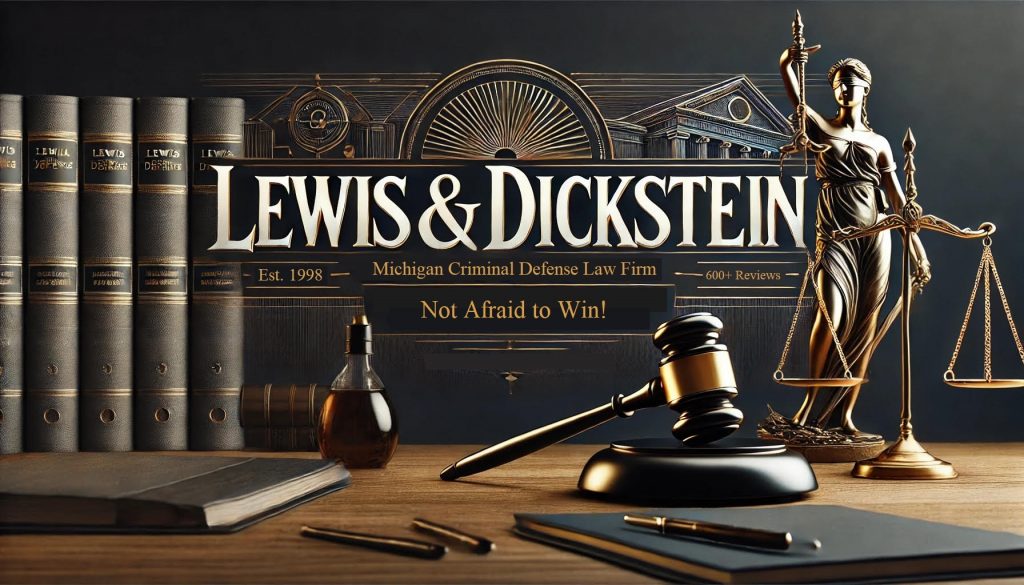Michigan White Collar Crimes Attorney
Attorneys Dedicated to the Passionate, Zealous, and Effective Defense of Those Charged with Committing White Collar Crimes in Michigan

Unparalleled Track Record of Success Defending White-Collar Charges
Suppose you or someone you love is charged with or accused of white-collar crime in Michigan, like bribery, fraud, embezzlement, or conspiracy. In that case, the following information should be beneficial to you. The experienced, capable white-collar crime attorneys with LEWIS & DICKSTEIN, P.L.L.C. have decades of experience defending clients charged with these offenses.
White-collar crimes are different from many other offenses because their consequences are frequently far more severe than financial penalties and potential incarceration. The consequences of white-collar convictions, and sometimes mere public allegations, can result in loss of employment, reputation, family, and professional licenses. These convictions can result in someone losing their financial ability to support themselves and their family.
What is white-collar crime?
White-collar crime refers to non-violent activity that is usually business, financial, or fraud-related. Typically, the allegations are of activity that involves dishonesty. Examples of white-collar crimes include but are not limited to embezzlement, fraud, misconduct in public office, misappropriation, and conspiracy, which are common white-collar crimes. People charged with white-collar crimes usually act as agents, employees, or representatives of a business, organization, charity, or government. White-collar offenses typically, but do not always, relate to a breach of trust or fiduciary duty.
Michigan Prosecutors often allege activities involving obtaining money, property, services, or preferential treatment dishonestly. While some people accused of white-collar crime have made calculated decisions to deceive, others do not know their actions are illegal. Either way, the seriousness of white-collar crimes is significant, and ignorance of the law is not a defense. On the other hand, a lack of intent may be a winning defense if presented in a thorough, credible, and persuasive manner by an experienced white-collar defense attorney.

White Collar Crime Penalties
White-collar crimes are typically felonies and carry the risk of severe punishment. People charged with these offenses often complain that prospective jail sentences are higher on white-collar crimes than on some violent felonies. The reason for this seemingly unfair disparity is that the public outcry against white-collar crime is usually significant. Victims of white-collar crime are typically eager to pursue prosecution. Law enforcement agents and police officers aggressively pursue charges in these cases because victims are frequently connected politically or financially. Michigan judges generally want to set an example for others tempted to engage in similar conduct.
Judges do not always order incarceration for those convicted of white-collar offenses. A top white-collar criminal defense lawyer can have a significant impact in reducing any potential term of imprisonment. A judge will order a convicted person to pay restitution (sometimes at unduly harsh or unrealistic terms). Convictions regularly result in substantial fines and restitution, damage to reputations, and can result in the loss of a professional business license.
White-collar prosecutions are often complicated and can be exceedingly complex. Michigan’s laws that address financial crimes range from narrowly tailored statutes to extensive catchall laws that broadly cover any allegations of dishonest behavior. With so much at risk and so many intricate details, you must have an experienced white-collar defense team on your side.
How do the experienced defense lawyers with LEWIS & DICKSTEIN, P.L.L.C. fight allegations of white-collar crime?
White-collar criminal charges differ from other offenses in the scope and length of the investigation made by the prosecution and, frequently, the aggressiveness of law enforcement investigating the crime. Whether state or federal, these investigations may take weeks, months, or even years before filing charges. A person who is or may be under investigation must be proactive. The best defense is a good offense. Those people charged with white-collar crimes may have been able to avoid charges with the aggressive pre-charge intervention of an experienced criminal defense attorney.
Pre-charge negotiations may result in dismissed or reduced charges or favorable sentence agreements if charges are unavoidable. We have successfully negotiated civil restitution or cooperation in cases and helped clients avoid criminal charges altogether.

Types of Offenses
Embezzlement
Embezzlement is the unauthorized disposal or acquisition of money, property, or things of value by an employee or agent. Any time such a person fraudulently uses another’s property, that person commits embezzlement. An act of embezzlement can be complicated, such as an accountant or stockbroker skimming money from client accounts or as simple as a store cashier taking cash from a cash register.
Fraud
Generally, fraud is intentionally deceiving someone into giving away money, property, or something else of value. Fraud can take many forms. One broad category of fraud is benefits fraud, including mortgage fraud, healthcare fraud, Medicare fraud, and insurance fraud. For example, an allegation of insurance fraud might be that someone attempted through dishonesty to receive payment from an insurer based upon a fraudulent claim for life, property, and automobile insurance. In Michigan, there are many variations in fraud charges at the state and federal levels. The attorneys with LEWIS & DICKSTEIN, P.L.L.C. have close connections with experts who can help defend against white-collar charges, including forensic accountants, former IRS agents, retired police officers, and document examiners.
Conspiracy
In the context of a white-collar criminal charge, conspiracy consists of one or more persons agreeing to participate in illegal activity. There must be an intentional agreement to engage in the offense and an overt act to further the conspiracy. In addition to state charges, several federal charges are related to conspiracy to commit white-collar crimes that the United States Attorney may prosecute in the United States District Court in Michigan. Conspiracy defense attorneys must be particularly fearless because prosecutions of conspiracy charges are complicated, and the consequences are severe. Defense strategies must be creative, effective, and intelligent.
Money Laundering
Money laundering is disguising illegal money sources to make them look like they came from legal sources. These prosecutions are most frequently in federal court; however, state prosecutors can also charge someone with felony money laundering.
Bribery
Bribery, a form of corruption, is an act implying money or a gift given that alters the recipient’s behavior. Bribery constitutes a crime. It is defined as the offering, giving, receiving, or soliciting of any item of value to influence the actions of an official or other person in charge of public or legal duty. The bribe is the gift bestowed to influence the recipient’s conduct. It might be money, goods, rights in action, property, preferment, privilege, emolument, an object of value, advantage, or merely a promise or undertaking to induce or influence a person’s action, vote, or the influence of a person in an official or public capacity.
Counterfeiting
To counterfeit means to imitate something illegally. People who counterfeit products intend to take advantage of the superior value of the imitated product. The word “counterfeit” frequently describes the forgeries of currency, documents, and imitations of works of art, clothing, software, pharmaceuticals, watches, electronics, and company logos and brands.
False Pretenses
False Pretenses is an offense involving intent to defraud, a false representation, and obtaining property due to that misrepresentation. Several offenses may include allegations of false pretenses. Depending on the victim’s alleged loss, the crime can be punishable by as little as 93 days in jail or up to 20 years in prison.
Identity Theft
Identity theft, also known as ID theft, is when someone obtains key pieces of personal information, such as Social Security or driver’s license numbers, to pose as someone else. Using the victims’ names and personal identifying information can be used to obtain credit, merchandise, and services. Identity theft can also provide a thief with false credentials for immigration or other applications. One of the biggest problems with identity theft is that the crimes committed by the person committing identity theft might result in false accusations against the victim.
Tax Evasion
Tax Evasion or income tax fraud can be either any of two things: a person willfully and knowingly tried to evade or elude taxes or owes more tax than stated in their tax returns. Tax evasion is a federal felony with a maximum fine of $100,000 and a maximum prison sentence of 5 years. The evidence of tax evasion doesn’t need to show the exact amount of additional tax debt. The reality that the individual willfully and knowingly evaded tax must be proven.

Influential White-Collar Criminal Defense Attorneys
If you face white-collar crime allegations, it is imperative that you find an attorney whom you trust to fight for you. Do not volunteer any information to the police, a private investigator, an employer, or anyone other than your lawyer. Your attorney should speak for you. Remember that anything you say “can and will be used against you.” The importance of remaining silent and having legal counsel is equally valid if you are innocent. Police and investigators are experts at twisting words to make innocent people appear deceptive or guilty of something they did not do. Call LEWIS & DICKSTEIN, P.L.L.C. for a free consultation. We will take the time to talk with you, answer your questions, and address your concerns. Together, we will craft a winning defense strategy.
Call us today at (248) 263-6800 for a free consultation or complete an online Request for Assistance Form. We will contact you promptly and find a way to help you.








